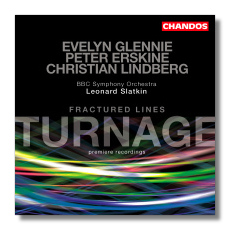
The Internet's Premier Classical Music Source
Related Links
- Latest Reviews
- More Reviews
-
By Composer
-
Collections
DVD & Blu-ray
Books
Concert Reviews
Articles/Interviews
Software
Audio
Search Amazon
Recommended Links
Site News
 CD Review
CD Review
Mark-Anthony Turnage

Fractured Lines
- Another Set To
- Silent Cities
- Four-Horned Fandango
- Fractured Lines
Christian Lindberg, trombone
Evelyn Glennie, Peter Erskine, percussion
BBC Symphony Orchestra/Leonard Slatkin
Chandos CHAN10018 DDD 56:25
"Punk without posturing" is how one might describe the concert music of Mark-Anthony Turnage (b. 1960), a "bad boy" among the younger generation of British composers. Punk music's splintering energy and confrontational stance can be found in Turnage's works, but not the lapses of style celebrated over substance, or of rules broken without any better replacements offered.
This CD contains four première recordings; the works themselves date from the latter part of the last decade and the beginning of the present one. As is often the case, they were written with specific performers in mind. Trombonist Christian Lindberg was the inspiration behind Another Set To, which sounds like nine minutes of taunts exchanged between the trombone and the orchestra. Granted, there's something cocky about the solo writing, so it's no wonder that the orchestra tries (unsuccessfully) to take the trombonist down a peg. Although Another Set To is full of shouts and high spirits, one would be stretching a point to call it friendly. Silent Cities is based (loosely) on a tune by jazz guitarist to John Scofield, and the title is an allusion to Rudyard Kipling's description of graves on the Somme – an interesting fact, given that Turnage wrote Silent Cities is memory of composer Sir Michael Tippett, a famous conscientious objector who was imprisoned for his beliefs. The music itself – angry but articulate, and alive with chiaroscuro scoring - is reminiscent of the work of Harrison Birtwistle, whom, with Tippett, Turnage also cites as a strong influence on his music.
SilentCities and Four-Horned Fandango were revised since their premières, and it is the revised versions that have been recorded here. A phalanx of horns can make an attractive sound – see Robert Schumann's Konzertstück – or it can be terrifying – see Bernard Herrmann's score to On Dangerous Ground. Turnage, who was looking to give the City of Birmingham Symphony Orchestra's four horns something to do before a post-intermission performance of Walton's Belshazzar's Feast, wrote an impressive work which, not as Spanish-sounding as its name might suggest, is alternately tough and haunted. Turnage's tempo indications ("Murky," "Strange and subdued," "Murky and sinister," "Light and eerie," etc.) remind me of Poul Ruders. Musically, given their sincerity and their taste for confrontation, Turnage and Ruders seem to have much in common.
The last work on this CD is a sixteen-minute concerto for two percussionists and orchestra. Turnage has based Fractured Lines on a tune by jazz percussionist Peter Erskine, who performs the work here with Evelyn Glennie – a more classically oriented percussionist, of course. It is interesting to hear how Turnage respects and challenges the stylistic differences between the two soloists, even to extent of allowing Erskine the opportunity to improvise in his cadenza. Again, this is not relaxing music to listen to, but it is driven by a fierce intelligence and a discriminating ear for color and shade. Even if one might not feel particularly attracted to Fractured Lines, one can't help but admire the mind that composed it and try to meet the music halfway.
Turnage was present at the recording sessions, and as Erskine, Glennie, and Lindberg are the original performers, I assume that Turnage got exactly what he wanted out of the sessions. (Now that Slatkin records for Chandos, it is interesting to see a more adventurous side of him.) The recording was made in Walthamstow Assembly Hall, and Ralph and Brian Couzens have done their usual superb job in getting the best sound out of the performers and the venue.
Copyright © 2002, Raymond Tuttle


















